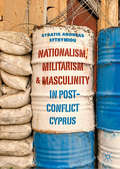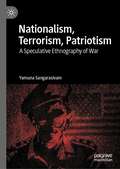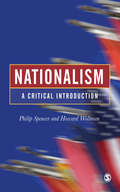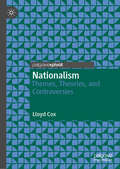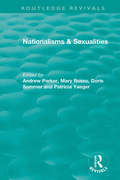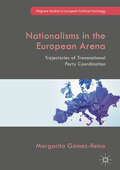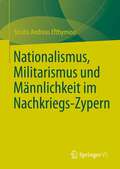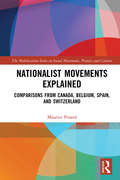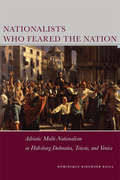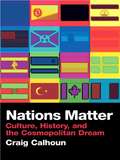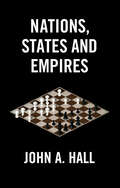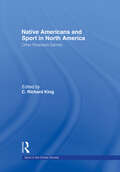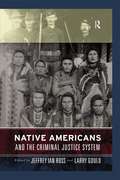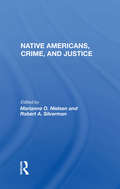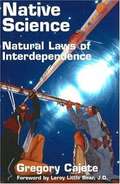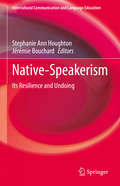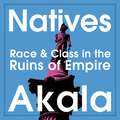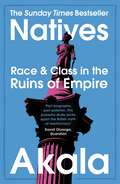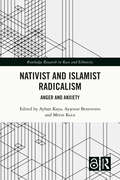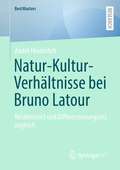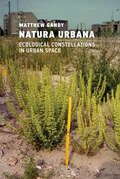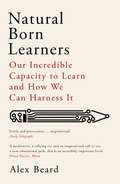- Table View
- List View
Nationalism, Militarism and Masculinity in Post-Conflict Cyprus
by Stratis Andreas EfthymiouThis book uses empirical research to introduce the relationship between nationalism, militarism and masculinity. The co-constitution between these three factors is susceptible to change and hinders reconciliation, according to the author. Drawing on the case of Cyprus, a country in conflict with Turkey, Efthymiou reveals how nationalism, militarism and masculinity were constructed after the war, and re-adapted following the opening of internal borders and European Union accession.Nationalism, Militarism and Masculinity in Post-Conflict Cyprus draws on rich field-research, with soldiers and officers in army barracks, politicians such as former President of Republic of Cyprus Glafkos Clerides, leaders of radical far-right movements and the Greek Cypriot public. The book offers invaluable insight into the application of nationalism, militarism and masculinity in governmental policy including by the Cyprus Defence Ministry, and will be of interest to students and scholars in sociology, gender studies, peace studies, security studies, politics and international relations, as well as governments and NGOs.
Nationalism, Myth, and the State in Russia and Serbia: Antecedents of the Dissolution of the Soviet Union and Yugoslavia
by Veljko VujačićThis book examines the role of Russian and Serbian nationalism in different modes of dissolution of the Soviet Union and Yugoslavia in 1991. Why did Russia's elites agree to the dissolution of the Soviet Union along the borders of Soviet republics, leaving twenty-five million Russians outside of Russia? Conversely, why did Serbia's elite succeed in mobilizing Serbs in Croatia and Bosnia for the nationalist cause? Combining a Weberian emphasis on interpretive understanding and counterfactual analysis with theories of nationalism, Veljko Vujačić highlights the role of historical legacies, national myths, collective memories, and literary narratives in shaping diametrically opposed attitudes toward the state in Russia and Serbia. The emphasis on the unintended consequences of communist nationality policy highlights how these attitudes interacted with institutional factors, favoring different outcomes in 1991. The book's postscript examines how this explanation holds up in the light of Russia's annexation of Crimea.
Nationalism, Terrorism, Patriotism: A Speculative Ethnography of War
by Yamuna SangarasivamThis book examines the intersecting forces of nationalism, terrorism, and patriotism that normalize an acceptance of the global war on terror as essential to maintaining freedom and democracy as defined by white nation-states. Readers are introduced to speculative ethnography: an experimental methodology that bends time and space through the practice of avant-garde poetics. This study conceptualizes terrorism as a place of colonial encounters between soldiers, insurgents, civilians, and leaders of nation-states. The tactics of suicide bombings employed by the Tamil nationalist movement, the Liberation Tigers of Tamil Eelam, are juxtaposed with drone strikes in asymmetric warfare where violence becomes a means of dialogue. Each chapter weaves seemingly disparate narratives from multiple experiences and sites of war, inviting readers to witness the condition of getting lost in that willful attachment to killing and being killed in service of patriotic pride and national belonging.
Nationalism: A Critical Introduction
by Mr Howard Wollman Mr Philip Spencer`Spencer and Wollman remain succinct and clear in their critical introduction to the most influential nationalism theories. The book is well structured, the arguments clearly presented. Its format makes it a great textbook for all seeking a deeper understanding of nationalism and national identity, while those already familiar with the subject will no doubt enjoy this erudite volume as well' - Sociology `This book is a valuable source for the interested reader who needs a concise and critical introduction into theories and theorists of nationalism. The extensve bibliography and a good index make it a work which should be on the bookshelf of anyone teaching nationalism' - Journal of Contemporary European Studies Nationalism provides an indispensable review of the study of nationalism that both introduces and critically positions all the main issues, theories and contemporary debates. Drawing upon and introducing a wide range of literatures from across politics, sociology, history, social anthropology and cultural studies, the authors seek to further challenge fixed notions of national identity, ethnicity and culture to more fully explore and understand the contemporary complexities of citizenship and the genuine potential for a cosmopolitan democracy. The text surveys both classical and contemporary approaches including those from within feminism, postmodernism, postcolonialism and globabalization studies. It will be essential reading for all students and academics seeking a deeper understanding of nationalism and national identity today.
Nationalism: Themes, Theories, and Controversies
by Lloyd CoxThis book provides a concise, critical analysis of the key themes, theories, and controversies in nationalism studies. It offers an historically informed and sophisticated overview of classical and contemporary approaches to nationalism, as well as setting out an agenda for future research on nationalism and the emotions. In so doing, the book illuminates nationalism’s contemporary power and resilience, as manifested in the growth of far-right nationalist populism in Europe, the white ethno-nationalism of Trump in the United States, the resurgence of great power nationalism and rivalry in Asia, and the resilience of national secessionist movements in diverse parts of the planet. The widespread nationalistic responses to the coronavirus pandemic provide further confirmation of the continuing power of nationalism. All of these developments are discussed in the book, which will be an invaluable resource for nationalism scholars and students in Sociology, Politics and History.
Nationalisms & Sexualities (Routledge Revivals)
by Andrew Parker Doris Sommer Patricia Yaeger Mary RussoOriginally published in 1992, Nationalisms and Sexualities addresses questions of how notions of identity are shaped by discussions of nationalism and sexuality. The book looks at a variety of disciplinary and theoretical perspectives, on a wide range of geographical regions and historical moments. The volume departs from social scientific paradigms that treat nation and sexuality as discrete and autonomous entities. Its contributors respond instead to emerging issues that redefine the horizons of what is globally considered today as "the political": how the formation of sexual, gendered, racial, and/or class identities have contributed to the formation of sexual, gendered, racial, and/or class identities, and vice versa; how technologies of representation play a role in the constitution of national and sexual identities; how colonialism and postcolonialism have altered consolidations of national and sexual identities.
Nationalisms in the European Arena: Trajectories of Transnational Party Coordination (Palgrave Studies in European Political Sociology)
by Margarita Gómez-ReinoThis book explores how the multiplicity of nationalist parties across the European Union have embraced or refused the process of European integration and made it a platform for transnational coordination in the European arena. The author analyzes how opposing pro-European minority nationalist parties and Eurosceptic populist nationalist parties have diversely politicized European integration over the past three decades and engage in different patterns of Europeanization. Tracing their divergent trajectories of transnational coordination, the book examines the common challenges these opposing nationalist party families face and their systematic fragmentation in the European arena. The book offers a novel approach to understanding the conditions for the emergence of truly European nationalist party families, based on the interaction of ideological, strategic and institutional variables that underpin the Europeanization of heterogeneous nationalisms.Nationalisms in the European Arena will be of interest to students and scholars across a range of disciplines including sociology and political science. It contributes to the increasing literature on identity politics in the European Union and reveals the mechanisms behind why the European arena is adverse to the political translation and organization of domestic nationalisms as distinctive European actors.
Nationalismus, Militarismus und Männlichkeit im Nachkriegs-Zypern
by Stratis Andreas EfthymiouIn diesem Buch wird anhand empirischer Untersuchungen die Beziehung zwischen Nationalismus, Militarismus und Männlichkeit dargestellt. Die Ko-Konstitution zwischen diesen drei Faktoren ist anfällig für Veränderungen und behindert die Versöhnung, so der Autor. Am Beispiel von Zypern, einem Land im Konflikt mit der Türkei, zeigt Efthymiou, wie Nationalismus, Militarismus und Männlichkeit nach dem Krieg konstruiert und nach der Öffnung der Binnengrenzen und dem Beitritt zur Europäischen Union neu angepasst wurden. Nationalism, Militarism and Masculinity in Post-Conflict Cyprus (Nationalismus, Militarismus und Männlichkeit in Zypern nach dem Konflikt) stützt sich auf eine umfangreiche Feldforschung mit Soldaten und Offizieren in Kasernen, Politikern wie dem ehemaligen Präsidenten der Republik Zypern, Glafkos Clerides, Führern radikaler rechtsextremer Bewegungen und der griechisch-zyprischen Öffentlichkeit. Das Buch bietet unschätzbare Einblicke in die Anwendung von Nationalismus, Militarismus und Männlichkeit in der Regierungspolitik, einschließlich des zypriotischen Verteidigungsministeriums, und wird für Studierende und Wissenschaftler in den Bereichen Soziologie, Gender Studies, Friedensforschung, Sicherheitsstudien, Politik und internationale Beziehungen sowie für Regierungen und NRO von Interesse sein..
Nationalist Movements Explained: Comparisons from Canada, Belgium, Spain, and Switzerland (The Mobilization Series on Social Movements, Protest, and Culture)
by Maurice PinardThis book examines nationalist movements in four ethnically plural countries, one of which has no previous experience of such movements at the national level. Presenting comparisons of the cases of Canada, Belgium, Switzerland, and Spain, including descriptions of the social, economic, and political contexts in each country, the author investigates the various determinants of each movement, shedding new light on what accounts for ethnic conflict and harmony. With attention to the degrees of equality and inequality among the various ethnic groups in each society, the extent to which these segments are fragmented and the degree to which there is internal communal integration, this volume also examines the particular roles played by political parties and resources in nationalist movements. A unique contribution to social movement theory based on important comparative analyses, this work will appeal to scholars of sociology and politics with interests in ethnic mobilization and contemporary social movements.
Nationalist Violence in Postwar Europe
by Luis De La CalleThis book argues that nationalist violence in developed countries is the product of unresponsive political elites and nationalists blocked from attracting supporters through legal channels. Political elites are prone to ignoring a regional polity when their clout in that region is negligible and they do not rely on the region's support to maintain their positions of power. Conversely, when nationalists cannot make inroads through legal channels, incentives for violence are ripe. Thus, when nationalists in postwar Europe found elites unresponsive, it was state repression that helped radicals build a new group of support around militant action. The larger this new constituency legitimizing violence grew, the longer the conflict lasted. The book elucidates this complex dynamic through a deft combination of theoretical modeling, statistical methods, and comparative case studies from the Basque Country, Catalonia, Corsica, Northern Ireland, Sardinia, and Wales. First comprehensive research on subject, since it investigates all relevant cases of nationalist mobilization in Europe. Offers new study methods not only on nationalism but also on violence. Unique combination of theoretical analysis and comparative case studies.
Nationalists Who Feared the Nation: Adriatic Multi-Nationalism in Habsburg Dalmatia, Trieste, and Venice
by Dominique Kirchner ReillWe can often learn as much from political movements that failed as from those that achieved their goals. Nationalists Who Feared the Nationlooks at one such frustrated movement: a group of community leaders and writers in Venice, Trieste, and Dalmatia during the 1830s, 40s, and 50s who proposed the creation of a multinational zone surrounding the Adriatic Sea. At the time, the lands of the Adriatic formed a maritime community whose people spoke different languages and practiced different faiths but identified themselves as belonging to a single region of the Hapsburg Empire. While these activists hoped that nationhood could be used to strengthen cultural bonds, they also feared nationalism's homogenizing effects and its potential for violence. This book demonstrates that not all nationalisms attempted to create homogeneous, single-language, -religion, or -ethnicity nations. Moreover, in treating the Adriatic lands as one unit, this book serves as a correction to "national" histories that impose our modern view of nationhood on what was a multinational region.
Nations Matter: Culture, History and the Cosmopolitan Dream
by Craig CalhounCraig Calhoun, one of the most respected social scientists in the world, re-examines nationalism in light of post-1989 enthusiasm for globalization and the new anxieties of the twenty-first century. Nations Matter argues that pursuing a purely postnational politics is premature at best and possibly dangerous. Calhoun argues that, rather than wishing nationalism away, it is important to transform it. One key is to distinguish the ideology of nationalism as fixed and inherited identity from the development of public projects that continually remake the terms of national integration. Standard concepts like 'civic' vs. 'ethnic' nationalism can get in the way unless they are critically re-examined – as an important chapter in this book does. This book is essential reading for undergraduate and postgraduate students of sociology, history, political theory and all subjects concerned with nationalism, globalization, and cosmopolitanism.
Nations, States and Empires
by John A. HallThis book traces the interactions between nations, states and empires in the making of the modern world. It is commonly assumed that nation states succeeded and replaced empires, relegating empires to the past: Hall argues that this is not the case. Empires have continued alongside nation states, shadowing them and overseeing them in the industrial era. The two world wars were imperial wars, rather than wars between nation states. Even after rapid decolonization in the 1950s and 1960s, empires persisted in the USA and the USSR. Furthermore, empires are not finished: the USA retains enormous power whilst Russia and China increasingly show imperial dispositions. Furthermore, empires and nation states do not exist in separate compartments— rather, they often overlap. Consider the USA—at once highly nationalist and the greatest empire in the history of the world. This highly original book will be essential reading for students and scholars in sociology and politics and for anyone interested in the political forces that have shaped, and continue to shape, the modern world.
Native Americans and Sport in North America: Other People's Games (Sport in the Global Society)
by C. Richard KingTaking examples from the United States and Canada, this comprehensive text offers compassionate and critical accounts of the Native American sporting experience. It challenges popular images of indigenous athletes and athletics; it explores Native American participation in and appropriation of EuroAmerican sports; and it unpacks social categories,
Native Americans and the Criminal Justice System: Theoretical and Policy Directions
by Jeffrey Ian Ross Larry Gould'This collection presents significant summaries of past criminal behavior, and significant new cultural and political contextualizations that provide greater understanding of the complex effects of crime, sovereignty, culture, and colonization on crime and criminalization on Indian reservations.' Duane Champagne, UCLA (From the Foreword) Native Americans and the Criminal Justice System offers a comprehensive approach to explaining the causes, effects, and solutions for the presence and plight of Native Americans in the criminal justice system. Articles from scholars and experts in Native American issues examine the ways in which society's response to Native Americans is often socially constructed. The contributors work to dispel the myths surrounding the crimes committed by Native Americans and assertions about the role of criminal justice agencies that interact with Native Americans. In doing so, the contributors emphasize the historical, social, and cultural roots of Anglo European conflicts with Native peoples and how they are manifested in the criminal justice system. Selected chapters also consider the global and cross-national ramifications of Native Americans and crime. This book systematically analyzes the broad nature of the subject area, including unique and emerging problems, theoretical issues, and policy implications.
Native Americans, Crime, And Justice
by Marianne O. NielsenThe historical involvement of Native peoples within the criminal justice system is a narrative of tragedy and injustice, yet Native American experience in this system has not been well studied. Despite disproportionate representation of Native Americans in the criminal justice system, far more time has been spent studying other minority groups. Nat
Native Science: Natural Laws of Interdependence
by Gregory CajeteCajete examines the multiple levels of meaning that inform Native astronomy, cosmology, psychology, agriculture, and the healing arts. Unlike the western scientific method, native thinking does not isolate an object or phenomenon in order to understand it, but perceives it in terms of relationship. An understanding of the relationships that bind together natural forces and all forms of life has been fundamental to the ability of indigenous peoples to live for millennia in spiritual and physical harmony with the land. It is clear that the first peoples offer perspectives that can help us work toward solutions at this time of global environmental crisis.
Native-Speakerism: Its Resilience and Undoing (Intercultural Communication and Language Education)
by Stephanie Ann Houghton Jérémie BouchardThis book explores native-speakerism in modern language teaching, and examines the ways in which it has been both resilient and critiqued. It provides a range of conceptual tools to situate ideological discourses and processes within educational contexts. In turn, it discusses the interdiscursive nature of ideologies and the complex ways in which ideologies influence objective and material realities, including hiring practices and, more broadly speaking, unequal distributions of power and resources. In closing, it considers why the diffusion and consumption of ideological discourses seem to persist, despite ongoing critical engagement by researchers and practitioners, and proposes alternative paradigms aimed at overcoming the problems posed by the native-speaker model in foreign language education.
Natives: Race and Class in the Ruins of Empire - The Sunday Times Bestseller
by AkalaSHORTLISTED FOR THE JAMES TAIT BLACK PRIZE | THE JHALAK PRIZE | THE BREAD AND ROSES AWARD & LONGLISTED FOR THE ORWELL PRIZE FOR POLITICAL WRITING'This is the book I've been waiting for - for years. It's personal, historical, political, and it speaks to where we are now' Benjamin Zephaniah'I recommend Natives to everyone' Candice Carty-WilliamsFrom the first time he was stopped and searched as a child, to the day he realised his mum was white, to his first encounters with racist teachers - race and class have shaped Akala's life and outlook. In this unique book he takes his own experiences and widens them out to look at the social, historical and political factors that have left us where we are today.Covering everything from the police, education and identity to politics, sexual objectification and the far right, Nativesspeaks directly to British denial and squeamishness when it comes to confronting issues of race and class that are at the heart of the legacy of Britain's racialised empire.Natives is the searing modern polemic and Sunday Times bestseller from the BAFTA and MOBO award-winning musician and political commentator, Akala.'The kind of disruptive, aggressive intellect that a new generation is closely watching' Afua Hirsch, Observer'Part biography, part polemic, this powerful, wide-ranging study picks apart the British myth of meritocracy' David Olusoga, Guardian'Inspiring' Madani Younis, Guardian'Lucid, wide-ranging' John Kerrigan, TLS'A potent combination of autobiography and political history which holds up a mirror to contemporary Britain' Independent'Trenchant and highly persuasive' Metro'A history lesson of the kind you should get in school but don't' Stylist
Natives: Race and Class in the Ruins of Empire - The Sunday Times Bestseller
by AkalaSHORTLISTED FOR THE JAMES TAIT BLACK PRIZE | THE JHALAK PRIZE | THE BREAD AND ROSES AWARD & LONGLISTED FOR THE ORWELL PRIZE FOR POLITICAL WRITING'This is the book I've been waiting for - for years. It's personal, historical, political, and it speaks to where we are now' Benjamin Zephaniah'I recommend Natives to everyone' Candice Carty-WilliamsFrom the first time he was stopped and searched as a child, to the day he realised his mum was white, to his first encounters with racist teachers - race and class have shaped Akala's life and outlook. In this unique book he takes his own experiences and widens them out to look at the social, historical and political factors that have left us where we are today.Covering everything from the police, education and identity to politics, sexual objectification and the far right, Nativesspeaks directly to British denial and squeamishness when it comes to confronting issues of race and class that are at the heart of the legacy of Britain's racialised empire.Natives is the searing modern polemic and Sunday Times bestseller from the BAFTA and MOBO award-winning musician and political commentator, Akala.'The kind of disruptive, aggressive intellect that a new generation is closely watching' Afua Hirsch, Observer'Part biography, part polemic, this powerful, wide-ranging study picks apart the British myth of meritocracy' David Olusoga, Guardian'Inspiring' Madani Younis, Guardian'Lucid, wide-ranging' John Kerrigan, TLS'A potent combination of autobiography and political history which holds up a mirror to contemporary Britain' Independent'Trenchant and highly persuasive' Metro'A history lesson of the kind you should get in school but don't' Stylist
Natives: Race and Class in the Ruins of Empire - The Sunday Times Bestseller
by AkalaSHORTLISTED FOR THE JAMES TAIT BLACK PRIZE | THE JHALAK PRIZE | THE BREAD AND ROSES AWARD & LONGLISTED FOR THE ORWELL PRIZE FOR POLITICAL WRITING'This is the book I've been waiting for - for years. It's personal, historical, political, and it speaks to where we are now' Benjamin Zephaniah'I recommend Natives to everyone' Candice Carty-WilliamsFrom the first time he was stopped and searched as a child, to the day he realised his mum was white, to his first encounters with racist teachers - race and class have shaped Akala's life and outlook. In this unique book he takes his own experiences and widens them out to look at the social, historical and political factors that have left us where we are today.Covering everything from the police, education and identity to politics, sexual objectification and the far right, Nativesspeaks directly to British denial and squeamishness when it comes to confronting issues of race and class that are at the heart of the legacy of Britain's racialised empire.Natives is the searing modern polemic and Sunday Times bestseller from the BAFTA and MOBO award-winning musician and political commentator, Akala.'The kind of disruptive, aggressive intellect that a new generation is closely watching' Afua Hirsch, Observer'Part biography, part polemic, this powerful, wide-ranging study picks apart the British myth of meritocracy' David Olusoga, Guardian'Inspiring' Madani Younis, Guardian'Lucid, wide-ranging' John Kerrigan, TLS'A potent combination of autobiography and political history which holds up a mirror to contemporary Britain' Independent'Trenchant and highly persuasive' Metro'A history lesson of the kind you should get in school but don't' Stylist
Nativist and Islamist Radicalism: Anger and Anxiety (Routledge Research in Race and Ethnicity)
by Ayhan Kaya Metin Koca Ayşenur BeneventoThis book analyses the factors and processes behind radicalisation of both native and self-identified Muslim youths. It argues that European youth responds differently to the challenges posed by contemporary flows of globalisation such as deindustrialisation, socio-economic, political, spatial, and psychological forms of deprivation, humiliation, and structural exclusion. The book revisits social, economic, political, and psychological drivers of radicalisation and challenges contemporary uses of the term “radicalism”. It argues that neoliberal forms of governance are often responsible for associating radicalism with extremism, terrorism, fundamentalism, and violence. It will appeal to students and scholars of migration, minority studies, nationalisms, European studies, sociology, political science, and psychology. The Open Access version of this book, available at http://www.taylorfrancis.com, has been made available under a Creative Commons Attribution-Non Commercial-No Derivatives 4.0 license
Natur-Kultur-Verhältnisse bei Bruno Latour: Relation(en) und Differenzierung(en) zugleich (BestMasters)
by André HinderlichDas Verhältnis des Menschen zur Natur beschäftigt die Soziologie seit ihrem Entstehen und ist in Anbetracht der Klimakrise und anderer mit ihr netzwerkartig verbundener Problemlagen ein Thema von besonderer Aktualität. In der Spätmoderne vollzieht sich ein Bruch mit der dualistischen Auffassung von Natur versus Kultur, unter anderem im Denken des französischen Philosophen und Soziologen Bruno Latour, welcher als einer der Hauptvertreter der Science & Technology Studies (STS) gilt. André Hinderlich verfolgt mit der vorliegenden Publikation eine begriffliche Ordnung und theoretische Klärung der mannigfaltigen Ausführungen, Versatzstücke und Konzepte zur prominent gewordenen Akteur-Netzwerk-Theorie (ANT), mit Fokus auf dem Verhältnis der Begriffspaare 'Relation(en)' und 'Differenzierung(en)'. Dies führt notwendigerweise über Latour hinaus, zu ergänzenden naturphilosophischen Reflexionen sowie weiteren Methodologien innerhalb der Umweltsoziologie.
Natura Urbana: Ecological Constellations in Urban Space
by Matthew GandyA study of urban nature that draws together different strands of urban ecology as well as insights derived from feminist, posthuman, and postcolonial thought.Postindustrial transitions and changing cultures of nature have produced an unprecedented degree of fascination with urban biodiversity. The &“other nature&” that flourishes in marginal urban spaces, at one remove from the controlled contours of metropolitan nature, is not the poor relation of rural flora and fauna. Indeed, these islands of biodiversity underline the porosity of the distinction between urban and rural.In Natura Urbana, Matthew Gandy explores urban nature as a multilayered material and symbolic entity, through the lens of urban ecology and the parallel study of diverse cultures of nature at a global scale. Gandy examines the articulation of alternative, and in some cases, counterhegemonic, sources of knowledge about urban nature produced by artists, writers, scientists, as well as curious citizens, including voices seldom heard in environmental discourse. The book is driven by Gandy&’s fascination with spontaneous forms of urban nature ranging from postindustrial wastelands brimming with life to the return of such predators as wolves and leopards on the urban fringe. Gandy develops a critical synthesis between different strands of urban ecology and considers whether "urban political ecology," broadly defined, might be imaginatively extended to take fuller account of both the historiography of the ecological sciences,and recent insights derived from feminist, posthuman, and postcolonial thought.
Natural Born Learners: Our Incredible Capacity to Learn and How We Can Harness It
by Alex BeardLearning is the soul of our species. From our first steps to our last words, we are what we learn. But for all its obvious importance, learning has lost touch with human progress. We live in an information age, work in a knowledge economy, yet our schools are relics of an industrial era. Education insider Alex Beard takes us on a dazzling tour of the future of learning to show how we can - and why we must - do better. Tackling everything from artificial intelligence to our growing understanding of the infant brain, Natural Born Learners is a user's guide to transforming learning in the twenty-first century and roadmap to accessing our better future selves.
